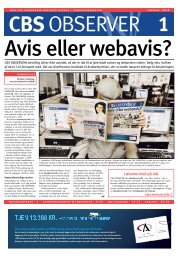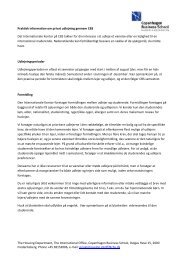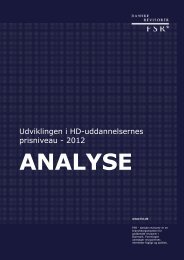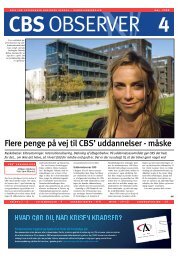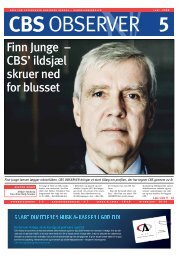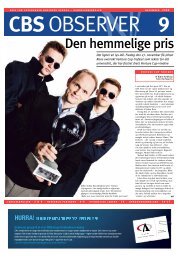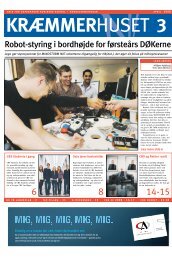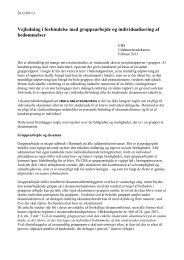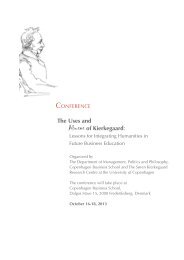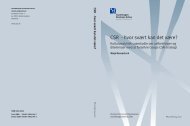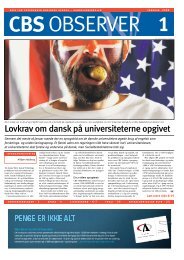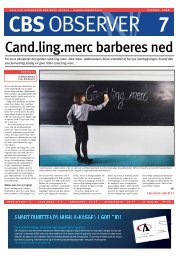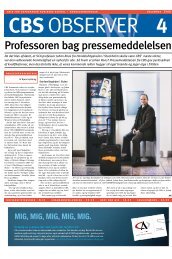september 2009.pdf - CBS OBSERVER
september 2009.pdf - CBS OBSERVER
september 2009.pdf - CBS OBSERVER
Create successful ePaper yourself
Turn your PDF publications into a flip-book with our unique Google optimized e-Paper software.
3 8<br />
C B S u m m a r y<br />
e d i t e d b y b j ø r n h y l d k r o g<br />
New <strong>CBS</strong> e-learning platform in just one year<br />
By this time next year, <strong>CBS</strong> expects to have replaced the school’s present e-learning platform,<br />
SiteScape. SiteScape is the interactive teaching platform used at <strong>CBS</strong> – mainly for uploading<br />
reading lists, cases and course notes by the lecturers and for class discussions by most of <strong>CBS</strong>’<br />
16101 students.<br />
SiteScape was taken over by Novell last year, and <strong>CBS</strong>’ faced either paying five times as<br />
much in license-fees or facing the headache of implementing a new e-learning platform.<br />
The choice was fairly easy for University Director Peter Pietras who was of the opinion that<br />
<strong>CBS</strong> could get more for the annual about one million DKR that the school presently pays in<br />
license-fees.<br />
Most likely, SiteScapes successor will be a tailored Open-Source platform, and Moodle is the<br />
one being subjected to closer scrutiny at present. The decision about whether or not to go with<br />
Moodle will be made more or less simultaneously with <strong>CBS</strong> <strong>OBSERVER</strong> hitting the stands. With<br />
a timeline of just one academic year to check out, test, tailor and implement a completely new<br />
e-learning platform<br />
encompassing most<br />
of <strong>CBS</strong>’ study programs,<br />
<strong>CBS</strong> is facing<br />
a major challenge.<br />
<strong>CBS</strong> <strong>OBSERVER</strong> will<br />
be following the process<br />
closely.<br />
Ethical business setting the agenda<br />
800 of <strong>CBS</strong>’ new students, amounting to about 40 percent of them, have been invited to attend<br />
a <strong>CBS</strong> Responsibility Day dedicated to introducing them to issues of responsibility, ethics and<br />
sustainability in both corporate and student life. This year also sees <strong>CBS</strong> launching a new elective<br />
on Corporate Social Responsibility (CSR) for 70 first year students, to be undertaken on<br />
top of the full first semester course load.<br />
Though it is the first time <strong>CBS</strong> has hosted such an event, the school’s research and study<br />
programs have maintained a strong focus on business ethics, CSR and sustainability since the<br />
eighties. This can to a fair extent be attributed to the influence of Professor Peter Pruzan, who<br />
was one of the business-researchers behind the development of social and ethical accounting<br />
and auditing.<br />
While <strong>CBS</strong> can be said to be a bit of a front-runner regarding CSR and business ethics, it is<br />
far from the only business school to stress its importance and maintain that CSR and business<br />
ethics are is not a matter of altruism, but og enlightened self-interest at profitability. This message<br />
seems to have reached this<br />
year’s Harvard MBA-graduates<br />
– who incidentally also feel the<br />
need to distance themselves from<br />
the unethical Wall Street players,<br />
much to blame for the present<br />
financial crisis.<br />
The Harvard MBA-students<br />
have instigated an MBA-oath of<br />
ethics in business, comparable<br />
to the Hippocratic Oath of the<br />
medical profession, that half this<br />
year’s graduates swore at a cer-<br />
emony before graduation. Several<br />
hundred MBA-graduates from business<br />
schools such as Yale, Stanford<br />
and Oxford followed up on the<br />
400 Harvard-graduates’ initiative.<br />
Harvard Business School student Danial Moon wearing<br />
a sign reading “The MBA Oath” before a Harvard<br />
University’s 358th Commencement Exercises in<br />
Cambridge, Massachusetts June 4, 2009.<br />
Get a handle on your learning style<br />
If you’ve ever wondered why in some classes you simply ‘get’ the teacher and the subject matter<br />
being taught, while in others you’re left to flounder and witness your classmates thundering<br />
along, the answer might lie in your learning style. Now <strong>CBS</strong> Learning Lab has developed<br />
the means to uncover your learning style along with materials that can aid you to benefit from<br />
the insight. The first phase of <strong>CBS</strong> Learning Lab’s learning styles project has now been realized<br />
with a homepage – www.cbs.dk/learningstyles – which offers <strong>CBS</strong> students and teachers<br />
the possibility of taking a learning styles test (The Danish Self-Assessment Learning Styles<br />
Inventory, D-SA-LSI). Taking this test gives you knowledge about your personal learning styles,<br />
as well as different possibilities for using this knowledge to work with your own learning, get<br />
the most out of study groups made op of people with different learning styles. And yes, there<br />
is a body of materials that you have to absorb – learn that is – in order to facilitate your selfreflection<br />
and utilization of the insight. 1<br />
c b s o b s e r v e r<br />
Next deadline: September 17th<br />
Unsolicited contributions: max. 1 A4 page<br />
Mail to: red.observer@cbs.dk<br />
1<br />
i n - h o u s e n e w s p a p e r f o r co p e n h a g e n b u s i n e s s s c h o o l<br />
Students give <strong>CBS</strong> good grades<br />
m o s t ly s a t i s f i e d<br />
By William Tylander<br />
Graphics: René Lynge<br />
High readings from the International Student<br />
Barometer indicate mostly clear skies for<br />
<strong>CBS</strong> exchange students with a slight chance<br />
of clouds on the horizon. <strong>CBS</strong>’ international<br />
exchange students have been surveyed .<br />
A 2008 report, issued by the International<br />
Insight Group (i-graduate), shows that <strong>CBS</strong> is<br />
on the right track when it comes to satisfying<br />
the needs and expectations of international<br />
students. The report was commissioned by<br />
CIRIUS the office under the Danish Ministry<br />
of Science and Technology in charge of internationalization<br />
and collected quantitative<br />
satisfaction survey results from international<br />
students in all of the Danish universities.<br />
- We wanted to find out what international<br />
student satisfaction was on the national level<br />
versus an established international benchmark.<br />
The survey confirmed our impressions<br />
that were based on the results of an<br />
internal survey in 2006 and served to highlight<br />
specific areas for us to work on and<br />
improve, reports CIRIUS representative Ken<br />
Thomassen.<br />
I-graduate is an independent research<br />
group based in the United Kingdom that<br />
has administered satisfaction surveys at over<br />
160 educational institutions the world over.<br />
The study is one of the largest of its kind<br />
and over the last two years the International<br />
Student Barometer (ISB) has been used to<br />
gather feedback from over 250,00 students.<br />
The online survey gauged student satisfaction<br />
across several key sectors, including<br />
learning, living and administrative support.<br />
In all more than 3500 students responded<br />
across Denmark with some 220 of them from<br />
<strong>CBS</strong>. Overall, students ranked good teachers,<br />
employability and reputation among the most<br />
important factors for choosing their study in<br />
Denmark.<br />
Measuring up <strong>CBS</strong><br />
In overall satisfaction <strong>CBS</strong> fared very well<br />
when measured up not only against the<br />
Danish universities as a whole, but also<br />
against ISB on average. When asked about<br />
studying in Denmark 74 percent of all international<br />
students responded positively, but<br />
when asked about <strong>CBS</strong> nearly 85 percent<br />
answered in the affirmative.<br />
Overall average responses in reception at<br />
arrival, learning and administrative support<br />
were significantly ahead of national averages.<br />
While responses to some key factors, such as<br />
teaching quality, lagged behind, ISB averages<br />
showing extraordinarily high scores on multiculturalism,<br />
library and learning environment<br />
were stand outs from the <strong>CBS</strong> report, which<br />
pushed the score ahead of the national average.<br />
Students also reported near total satisfaction<br />
with their reception at arrival and their<br />
further contact with and support from <strong>CBS</strong>’<br />
International Office.<br />
Niels Henrick, Deputy Director of <strong>CBS</strong>’<br />
International Programs, was understandably<br />
pleased with the findings.<br />
- This study confirms our hard work<br />
towards providing the top experience to our<br />
international exchanges here at this office.<br />
We know were up against some stiff challenges,<br />
especially on housing – the balance is<br />
in how we respond to and communicate with<br />
our exchange students by adding an individual<br />
approach and a personal touch.<br />
The report’s findings were not all rosy.<br />
Dissatisfaction with living conditions was high<br />
and on a par with Danish averages. Most common<br />
comments on living in Denmark centred<br />
on lack of affordable housing and the high<br />
cost of living. High marks on internet access<br />
and safety, however, bolstered results and<br />
showed respondents more or less satisfied<br />
overall and on level with national averages.<br />
Grapevine promotions<br />
The study also showed <strong>CBS</strong>’ exchange students<br />
more likely to recommend studying<br />
at <strong>CBS</strong> than was the case with respondents<br />
from other Danish institutions. The report<br />
remarks on how personal recommendations<br />
played a central roll in students choosing<br />
<strong>CBS</strong>. The marketing potential for this bit of<br />
news could explain <strong>CBS</strong> seeing a nearly 15<br />
percent increase in international applications<br />
to both exchange and full time programs.<br />
This bit of good news does not come without<br />
its challenges though – especially on the<br />
housing issue. As of early August, all rooms<br />
offered by the International Office have been<br />
spoken for, and additional housing is being<br />
actively sought.<br />
Just a piece of the puzzle<br />
This report may only be painting part of the<br />
picture. 97 percent of the international students<br />
who responded from <strong>CBS</strong> were from<br />
exchange programs and only three percent<br />
were full-degree students. While the survey’s<br />
200 <strong>CBS</strong>-respondents does make it statistically<br />
representative, is does only make up<br />
20 percent of the total number of exchange<br />
student that come to <strong>CBS</strong> in a given year. But<br />
most of all the notable absence of international<br />
full time students in the survey makes<br />
it difficult to gauge how the international student<br />
satisfaction rate actually is as a whole.<br />
1



